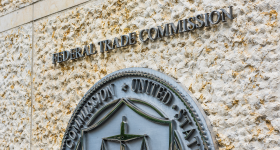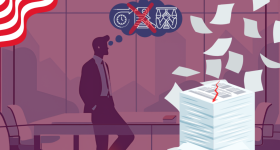Foundation Models and Generative AI Applications: What Competitive Concerns?
Authored by: Manganelli, Antonio
Working Paper about the competitive concerns of generative AI.


GW Working PAPER SERIES & Blog POSTS
The Working Paper Series of the GW Competition & Innovation Lab mostly publishes academic articles that are forthcoming in leading peer-reviewed journals. Submit your forthcoming article at gwucil gwu [dot] edu (gwucil[at]gwu[dot]edu) for review.
gwu [dot] edu (gwucil[at]gwu[dot]edu) for review.
The GW Competition & Innovation Lab regularly publishes original blog posts and op-eds published in leading outlets, that offer thought-provoking ideas about market regulation and innovation. Submit your blog post or op-ed at gwucil gwu [dot] edu (gwucil[at]gwu[dot]edu) for review.
gwu [dot] edu (gwucil[at]gwu[dot]edu) for review.

Foundation Models and Generative AI Applications: What Competitive Concerns?
Authored by: Manganelli, Antonio
Working Paper about the competitive concerns of generative AI.

No Doctor, No Problem: The Benefits of Innovation Expanding OTC Drug Access
Authored by: Stomberg, Chris
Working Paper about expanding OTC drug access through innovation.

One Digital Euro, Many Devices: Transplanting Interoperability Obligations
Authored by: Borgogno, Oscar
Working Paper about the interoperability of the Digital Euro.

Re: The Anti-Competitive Effects of Algorithmic Personalized Pricing and the Big Data Economy
Authored by: Larouche, Pierre
Working Paper about in response to the Canadian Competition Bureau about how algorithmic pricing is anti-competitive.

Authored by: Gaban, Eduardo
Working Paper about predatory litigation in Brazil.

Econometrics In UK Cartel Damage Cases: Why Is It Failing?
Authored by: Veljanovski, Cento
Working Paper about the issues with econometrics in UK cartel damage cases.

DAAG Bill Rinner's Remarks to the GW-Milbank Antitrust Salon
Authored by: Bill Rinner
DAAG Bill Rinner's address

Authored by: Mark Meador
FTC Commissioner Address

Authored by: Heim, Mathew, Authored by: Giosa, Penelope
Working Paper about competition authorities with leadership ambitions

Authored by: Marinova, Miroslava
Working Paper about the enforcement gap in the European Union

Analyzing Capabilities is Too Speculative: A Reply to David Teece
Authored by: Landman, Lawrence B.
Reply to Teece
![]]](/sites/g/files/zaxdzs6711/files/styles/social_small/public/2025-04/screenshot_2025-04-12_at_3.32.28_pm_copy.jpg?h=f47ffdfe&itok=eYW2z4pg)
Competition Law in Limbo: Intel, Fidelity Rebates, and the Price of a Procedural Error
Authored by: Marinova, Miroslava
Competition Law in Limbo: Intel, Fidelity Rebates, and the Price of a Procedural Error

Unlocking Manufacturer Utopia: AI’s Role in Perfect Price Discrimination
Authored by: Bergqvist, Christian, Authored by: Marinova, Miroslava
Unlocking Manufacturer Utopia: AI’s Role in Perfect Price Discrimination

Brazil's Regulatory Approach to Digital Platforms
Authored by: Gaban, Eduardo
An Evidence-Based Analysis and Comparative Assessment

The European Commission's Draft SEP Regulation: A Slippery Slope or a Renewed Hope?
Authored by: Singh, Manveen
A Slippery Slope or a Renewed Hope?

Authored by: Houngbonon, George V.
International and domestic digital connectivity are key drivers of trade in ICT service exports, with domestic digital connectivity crucial in determining top ICT service exporters.

The Regulation of the Cloud Market in the UK: Some Preliminary Thoughts and A Cautionary Tale
Authored by: Portuese, Aurelien
On the 6th of November 2023, the United Kingdom’s Office of Communication (commonly referred to as “Ofcom”) released a lengthy report on the competitive state of the country’s cloud services market.

Australia Remains in Regulatory Purgatory After a Decade of Crypto Policy Discussion
Authored by: Lane, Aaron
Australia’s regulatory approach to cryptocurrency and digital asset exchanges has been characterized by a series of parliamentary inquiries and conflicting consultations, culminating in legislative...

Authored by: Landman, Lawrence B.
A response to the Bureau’s proposed new Merger Enforcement Guidelines

Between Permission and Protection
Authored by: Larouche, Pierre
AI as a Challenge to Established Approaches to Law and Innovation

Artificial Intelligence and Financial and Economic Policy Making
Authored by: Aghion, Philippe
This Report is the outcome of the work of the High-Level Panel of Experts on Artificial Intelligence (AI). The report is intended to serve as a reference for policymakers. The Panel was established...

The Curious Case of the European Commission's Missing Jurisprudence
Authored by: Heim, Mathew
This paper shows that a high percentage of antitrust investigations that the Commission had formally prioritised (and at times even issued a Statement of Objections) have been closed without any...

New Powers, New HSR Rules: The Illumina Ripple Effect
Authored by: Portuese, Aurelien, Authored by: Landman, Lawrence B.
The article explores the impact of new Hart-Scott-Rodino rules on merger reviews, emphasizing their focus on protecting competition in Future Markets.


Authored by: Marinova, Miroslava
The European Commission’s Draft Article 102 Guidelines Under Fire: Examining the Substance and the Roots of the Criticism

The Dilemmas of the 2023 Merger Guidelines
Authored by: Portuese, Aurelien
The Dilemmas of the 2023 Merger Guidelines

Authored by: Isabella Lorenzoni
From the More Economic Approach to the More Digital and Data-Driven (DDD) Approach: Enforcing Competition Law in the Digital Era

The Battle for Search: United States v. Google LLC and Its Implications for Antitrust Law
Authored by: Marinova, Miroslava
The Battle for Search: United States v. Google LLC and Its Implications for Antitrust Law

Authored by: Marinova, Miroslava
Balancing Innovation and Regulation: Evaluation of the CMA’s Report on AI Foundation Models and their impact on competition and consumer protection

Authored by: Marinova, Miroslava
Rethinking the As-Efficient Competitor Test: Assessing the wider impact of the CJEU’s Judgment in Unilever and its Implications in Shaping the EU

The TRIPS Agreement in the Face of IP Judicial Fragmentation
Authored by: Borgogno, Oscar
This working paper examines the global rise of antitrust litigation over IP-related ASIs, a tool with extraterritorial impact that limits patent enforcement on standard essential technologies. As...

Refining Future Potential Competition: The Doctrine Allowing Courts to Protect Innovation
Authored by: Landman, Lawrence B.
Future Potential Competition is the new doctrine courts must use so they can decide when they should act to protect competition in Future Markets.

Navigating The Skies of Regulation and Innovation: The Case of Civil Drones
Authored by: Portuese, Aurelien
The deployment of Unmanned Aerial Vehicles (UAVs), colloquially known as civil drones, necessitates an in-depth analysis of regulatory frameworks to understand their impact on market competition and...

A Bottom-Up Proposal for Coordinated International AI Supervision
Authored by: Borgogno, Oscar
Artificial Intelligence (AI) is poised to permeate across different industry sectors, offering unprecedented opportunities alongside significant risks. Effective governance necessitates coordinated...

Three Stress Tests for the Future of European Antitrust Policy
Authored by: Portuese, Aurelien
Stress tests are important. They assist doctors in detecting heart abnormalities, financiers in anticipating financial shocks, and engineers in learning about the hidden vulnerabilities of operating...

Overview of India's Digital Competition Bill, 2024
Authored by: Lokesh Bulchandani
On March 12, 2024, the Indian Ministry of Corporate Affairs released the draft report of the Committee on Digital Competition Law along with a draft bill on the Digital Competition Act for public...

Disruptive Innovation and Antitrust
Authored by: De Streel, Alexandre, Authored by: Larouche, Pierre
Ever since the decisions of US and EU antitrust authorities in Microsoft at the turn of this century, there is some unease as to the effectiveness of competition or antitrust law enforcement when and...

Admissibility of Expert Economic Evidence In Competition Litigation
Authored by: Veljanovski, Cento
‘In matters of opinion I very much distrust expert evidence’, Lord Jessel MR (1873)

Understanding Dynamic Competition
Authored by: David Teece
This paper sees the opportunity for improving competition policy within existing legal frameworks if economic and business analysis can become more dynamic.

Fairness and Contestability in The Provision of Software Application Store Services
Authored by: Padilla, Jorge
On 4 March 2024, the European Commission (‘Commission’) fined Apple 1.8 billion euros for abusing its dominant position on the market for the distribution of music streaming apps to iPhone and iPad...

Authored by: Tshabalala, Mpumi
South Africa is currently experiencing a new surge of interim relief applications that has followed the 2019 Amendment to the Competition Act.

Authored by: Marinova, Miroslava
The application of the principle of proportionality in competition law enforcement is of utmost importance. However, there are concerns regarding its effective implementation under the DMCC Bill,...

The EU’s Investigation Into Microsoft Teams: A Preliminary Assessment
Authored by: Bergqvist, Christian
EU has opened an antitrust investigation into Microsoft's policy of including the communication software Teams in its Office 365 packages. Very little is known about the case and the alleged...

Rethinking the Legal Test for Excessive Pricing
Authored by: Miroslava Marinova
The legal treatment of excessive pricing in the pharmaceutical sector has been a topic of intense debate.

Draft for an FTC Policy Statement on the Prohibitions Against 'Unfair' Business Conduct
Authored by: Neil Averitt
Section 5 of the Federal Trade Commission Act prohibits unfair conduct in commercial practices. The core prohibitions are the bans on “unfair methods of competition” and on “unfair or deceptive acts...

Hayekian Competition Policy - A Historical Perspective
Authored by: Cento Veljanovski
Friedrich A. Hayek's (1899–1992) work on competition policy has been neglected.

While antitrust agencies regulate competition dynamics there is ample evidence that they also engaging in competition amongst their peer agencies to determine which agency is considered the most...

Competition and Generative AI: A contribution to the European Commission’s debate
Authored by: Rafael Parisi
With the purpose of contributing to the European Commission’s (EC) call for papers, this essay aims to provide insights on the role and importance of data for generative AI.

Competition in the Age of Generative AI
Authored by: Abraham Song
The Age of Generative AI has arrived with ChatGPT in 2022. A race for dominance is on and it is clear that the technology will dramatically transform our societies and economies.

Decentralised Autonomous Organizations: Targeting the Potential Beyond the Hype
Authored by: Oscar Borgogno and Edoardo Martino
Decentralised Autonomous Organisations (DAOs) aim at innovating the organization forms for business activities.

Potential Competition and the 2023 Merger Guidelines
Authored by: Richard J. Gilbert and A. Douglas Melamed
The Department of Justice and Federal Trade Commission 2023 Merger Guidelines arrived just before Christmas, bringing cheer to advocates of heightened merger enforcement and coal for others more...

Antitrust For Innovation: A Progress Report
Authored by: Richard J. Gilbert and A. Douglas Melamed
Economists have long understood that innovation has a far more significant impact on economic welfare than the deadweight loss from prices that exceed levels in competitive markets or from other...

Comments to the Brazilian Ministry of Economy’s Consultations on Digital Platforms Regulation
Authored by: Rafael Parisi
With the purpose of contributing with the Ministry of Economy’s consultations on the regulation of digital platforms (Consultations No. 1, from the Secretariat of Economic Reform of the Ministry of...

Authored by: Wong-Erwin, Koren, Authored by: Padilla, Jorge
In this essay we discuss the proposition, held by many economists and legal scholars, that with dynamic competition—i.e., competition for the market through sequential winner-take-all races won...

Towards Legal Recognition of Decentralised Autonomous Organisations
Authored by: Aaron M. Lane, Darcy W.E. Allen & Chris Berg
Decentralised Autonomous Organizations (DAOs) are a typical organisation form in the web3 economy.

Making Sense of EU Merger Control: The Need for Limiting Principles
Authored by: Aurelien Portuese
For many apparent reasons, merger control in the European Union (“EU”) has traditionally been centralized at the level of the European Commission.

Antitrust and Intellectual Property Rights: Toward a New Schumpeterian Approach
Authored by: Aurelien Portuese
The protection of intellectual property rights is worsening, but populist antitrust enforcement is expanding.

The Regulation of Competition in Brazil: Comments on the Digital Markets Law Bill (PL 2768/2022)
Authored by: Rafael Parisi
The bill presently under consideration in the Brazilian Congress, referred to as Bill No. 2768/2022 (hereafter “the Bill”), merits a reevaluation due to its potential adverse consequences on...

Precautionary Antitrust: The Changing Nature of Competition Law
Authored by: Aurelien Portuese
An underlying craze over the last few years surfaced abruptly.

New DOJ-FTC Merger Guidelines: Opportunities and Strategies for Merging Parties
Authored by: Jeremy Sandford & Koren Wong-Ervin
On December 18, 2023, the Department of Justice (“DOJ”) and the Federal Trade Commission (“FTC”) jointly released the final version of the Merger Guidelines. While the contours of the Guidelines...

Platform Power and Digital Regulation: Global Lessons, Local Realities - Esin Aygun
Authored by: Aygun, Esin
Esin Aygun's (Turkish Competition Authority) featured speech during our Next-Generation Regulation conference in Istanbul, Turkiye, in November 2025.

The Future of Competition Law in a Rapidly Changing Global Order - Antonio Capobianco
The OECD's Antonio Capobianco's opening keynote to our Next-Generation Regulation conference in Istanbul, Turkiye, in November 2025.

Authored by: Landman, Lawrence B.
Lawrence Landman's follow-up to his consultation for the European Commission.

Future Markets Model is the Administrable Framework for Protecting Innovation
Authored by: Landman, Lawrence B.
Lawrence Landman's consultation for the European Commission.

Authored by: Antonio Manganelli
Antonio Manganelli's consultation for the European Commission.

America-First Leadership On Tech Innovation
Authored by: Gene Burrus
For the last 25 years, America — and particularly Silicon Valley — has been the beating heart of global technology innovation. It’s been a key source of our economic power, military strength, and...

American Capitalism Must Reorient Toward the Long Term
Authored by: Portuese, Aurelien
David J. Teece and Aurelien Portuese argue that short-term thinking in American corporate governance, antitrust, and regulation is hampering American innovation and success even as other countries...

Interoperability: U.S. and EU Perspectives Compared
Authored by: Isabella Lorenzoni
In simple terms, “[i]nteroperability is the ability of different systems to work together by exchanging information”. Under the Digital Markets Act (DMA), “‘interoperability’ means the ability to...

Authored by: Stakheyeva, Hanna
In Türkiye, mergers and acquisitions (M&A) that exceed specific turnover thresholds must be notified to the Turkish Competition Authority (TCA) before implementation.

The As-Efficient Competitor Test: A Cornerstone or a Controversy in EU Competition Law?
Authored by: Marinova, Miroslava
The As-Efficient Competitor (AEC) test has long been a focal point in EU competition law, serving as a conceptual tool for assessing whether the conduct of a dominant company has exclusionary effects...

Competition Between Antitrust Agencies
Authored by: Heim, Mathew
Given the lack of empirical research on the key characteristics that underpin a "leading" competition agency, we are engaged in a project to fill that gap.

Authored by: Marinova, Miroslava
Reply to the European Commission Public Consultation on the Draft Guidelines on the Application of Article 102 TFEU to Exclusionary Abuses

Fighting children’s social media addiction in Hungary and the US
Authored by: Mónika Mercz
Fighting children’s social media addiction in Hungary and the US

Antitrust News of the Year: Peru's National Multisectoral Competition Policy is Coming
Authored by: Camacho Ordóñez, Mariana
Antitrust News of the Year: Peru's National Multisectoral Competition Policy is Coming

Talks on the DMA's Brussels Effect
Authored by: Mónika Mercz
Blogpost on Talks on the DMA's Brussels Effect
